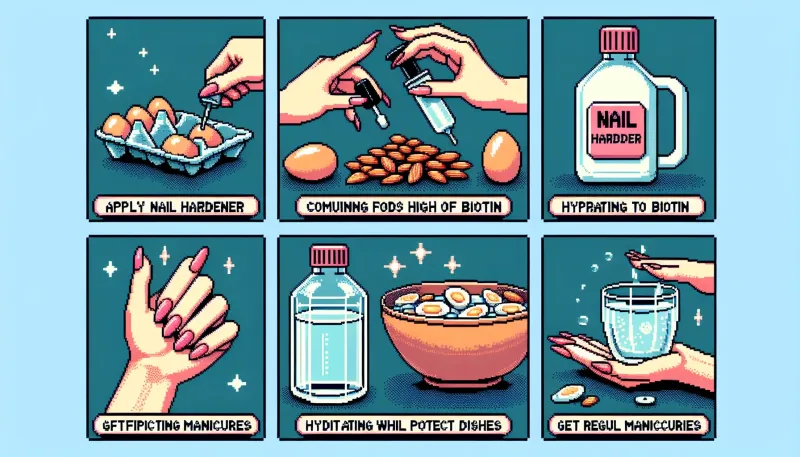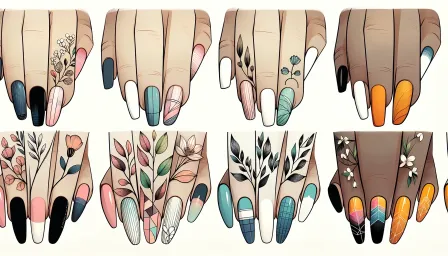Effective Nail Strengthening Tips for Maintaining Healthy Nails

Discover proven nail strengthening tips to maintain healthy nails. Learn how to keep your nails strong and reduce breakage with these expert tips.
Maintaining healthy nails goes beyond just keeping them polished and trimmed. It involves a holistic approach that includes proper nutrition, good nail care practices, and avoiding habits that can damage your nails. In this article, we will explore various effective nail strengthening tips to help you achieve and maintain healthy nails.
Nutrition and Diet for Nail Strengthening
What you eat plays a crucial role in the health of your nails. Nutrient deficiencies can lead to weak and brittle nails. Here are some essential nutrients you need for nail strengthening:
Protein
Nails are made of a protein called keratin. Consuming adequate amounts of protein-rich foods such as lean meats, eggs, nuts, and legumes can help fortify your nails.
Biotin
Biotin (vitamin B7) is known for its role in maintaining the health of nails, hair, and skin. Include biotin-rich foods like eggs, almonds, sweet potatoes, and spinach in your diet to promote nail strength.
Iron
Iron deficiency can cause nail problems such as spoon-shaped nails. Red meat, poultry, beans, and fortified cereals are good sources of iron.
Zinc
Zinc is essential for the growth and division of nail cells. Foods like oysters, beef, and pumpkin seeds are excellent sources of zinc.
Vitamin E
Vitamin E promotes nail health by acting as an antioxidant. Eat foods such as almonds, sunflower seeds, and avocados to boost your vitamin E intake.
Good Nail Care Practices
Keep Nails Clean and Dry
Dirt and bacteria can build up under your nails, leading to infections. Make sure to keep your nails clean and dry to prevent bacterial growth.
Trim Nails Regularly
Trimming your nails regularly helps prevent them from breaking or snagging. Use sharp manicure scissors or clippers and trim straight across, then round the tips in a gentle curve.
Moisturize Your Nails
Dry nails can become brittle and prone to breaking. Apply a moisturizer or nail oil regularly to keep your nails hydrated.
Avoid Harsh Chemicals
Exposure to harsh chemicals can weaken your nails. Use gloves when cleaning or handling chemicals, and opt for nail polishes and removers that are free from harmful ingredients like formaldehyde and toluene.
Be Gentle with Your Nails
Avoid using your nails as tools to open cans or scrape surfaces. Such activities can cause your nails to chip or break.
Preventive Measures
Limit Exposure to Water
Excessive exposure to water can make nails soft and weak. Wear gloves when washing dishes or doing other activities that involve prolonged water exposure.
Don't Bite Your Nails
Nail biting can damage the nail bed and lead to infections. If you have this habit, consider using bitter-tasting nail polish to discourage biting.
Avoid Acrylic and Gel Manicures
These types of manicures can weaken your nails over time. If you choose to get them, make sure to give your nails a break between treatments and follow a moisturizing routine.
Choose Non-Toxic Nail Polishes
Using non-toxic nail polishes can prevent exposure to potentially harmful chemicals. Look for "three-free" or "five-free" labels which indicate the absence of toxic substances.
Natural Remedies for Nail Strengthening
Olive Oil
Soaking your nails in warm olive oil can help strengthen them. Olive oil moisturizes the nails, improving their natural resilience.
Tea Tree Oil
Tea tree oil has antifungal properties that can treat nail infections. Dilute with a carrier oil and apply to your nails to promote health and strength.
Lemon Juice
Lemon juice can help whiten and strengthen nails. Mix with olive oil, soak a cotton ball, and rub onto your nails.
When to Seek Professional Help
Despite following these nail strengthening tips, you may still encounter persistent nail issues. In such cases, it may be wise to seek professional help.
Identifying Nail Disorders
If you notice unusual changes in nail color, shape, or thickness, it is important to consult a healthcare professional. Conditions like fungal infections, psoriasis, or anemia can manifest in your nails.
Professional Treatment Options
For diagnosed nail disorders, dermatologists may recommend treatments like topical or oral antifungals, medicated nail polish, or other specialized therapies to address underlying health issues.
Conclusion
Maintaining healthy nails requires a comprehensive approach that includes proper nutrition, diligent nail care, and preventive measures to avoid damage. By incorporating these nail strengthening tips, such as eating a balanced diet, keeping your nails clean and moisturized, and avoiding harsh chemicals, you can enjoy strong, healthy nails. Remember, if persistent problems arise, consulting a healthcare professional is crucial for proper diagnosis and treatment.



























